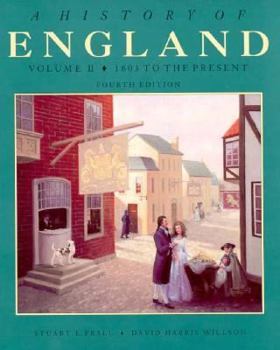A History of England, Volume II, from 1603
Select Format
Select Condition 
Book Overview
These comprehensive texts explore the history of England in all its aspects, from the earliest settlers to the birth of Princess Eugenie and the introduction of the Poll Tax. Ideal for a Survey of... This description may be from another edition of this product.
Format:Paperback
Language:English
ISBN:0030334276
ISBN13:9780030334276
Release Date:January 1991
Publisher:Cengage Learning
Length:416 Pages
Weight:0.45 lbs.
Dimensions:1.2" x 7.6" x 9.2"
Customer Reviews
1 rating
A Penetrating History of Whiggery in England
Published by Thriftbooks.com User , 18 years ago
The material in this book is great! I especially liked the authors' treatment of political Whig history. In the late 1600s, the Commons were divided into a Court Party and a Country Party. Shaftsbury drew the Country Party together and established the Green Ribbon Club. There the Whigs followed, standing for "limitation of royal power and for increased toleration for Protestants though not for Catholics". But when James II, 1685-88, began his reign, "the Whigs were crushed, the Tories blindly loyal". Things were bad under James! So in 1688, a group of Whig and Tory leaders, "acting together, extended an invitation to William III to invade England" with his army so that English citizens could assist William in deposing their King. Can you imagine this today in America? A group of our Senators and Congressman from both parties, asking Tony Blair to bring the British army, navy, and Air Force to bomb George Bush out of the White House? I mean today we have a procedure called impeachment (www.ImpeachBush.org). Even the English have it today (www.ImpeachBlair.org). But in 1688, it was asking a neighboring country's army to do it for you. Anyway, James fled. The Whigs and Tories met in a conciliatory spirit and wrote the English "Bill of Rights" in 1689, establishing a limited monarchy in England. In 1714, George I from Hanover (in Germany) became King of England and he liked Whigs; many were his personal friends. "The new ministers were almost entirely Whigs", say the authors. By 1715, there was a Whig majority in the House of Commons and from there it was quickly downhill for the Tories, who were branded "as Jacobites and traitors". By 1720, "everyone who hoped for office called himself a Whig". There were now Whigs in opposition as well as in the government. During the 1720s, "Walpole and Townsend were supreme". Walpole excelled in financial planning and economics. He was the Alan Greenspan of England at that time. The authors say "He believed that the best protection against Jacobitism was a prosperous and contented people, and he set about making England" rich. But being a politician, he made enemies among many Whigs. But really the term "Whig" was coming to mean little or nothing. The authors say "Everyone was a Whig unless he was distinctly a Tory". While the elites did prosper under these phoney Walpolean Whigs, the lower classes suffered. They never got the right to vote for the remainder of that century and more than half way into the next. The authors say "The end of the century was a bad time for all the smaller people". Prall and Willson's history is a remarkable story of England. If you want to know why Tony Blair is holding hands with George Bush today when Blair is Labour (Democrat) and Bush is Republican (Conservative), the authors do a good job of revealing the history that has led to American-powered British empire. This text should be required reading for all students at 4-year liberal arts colleges.





